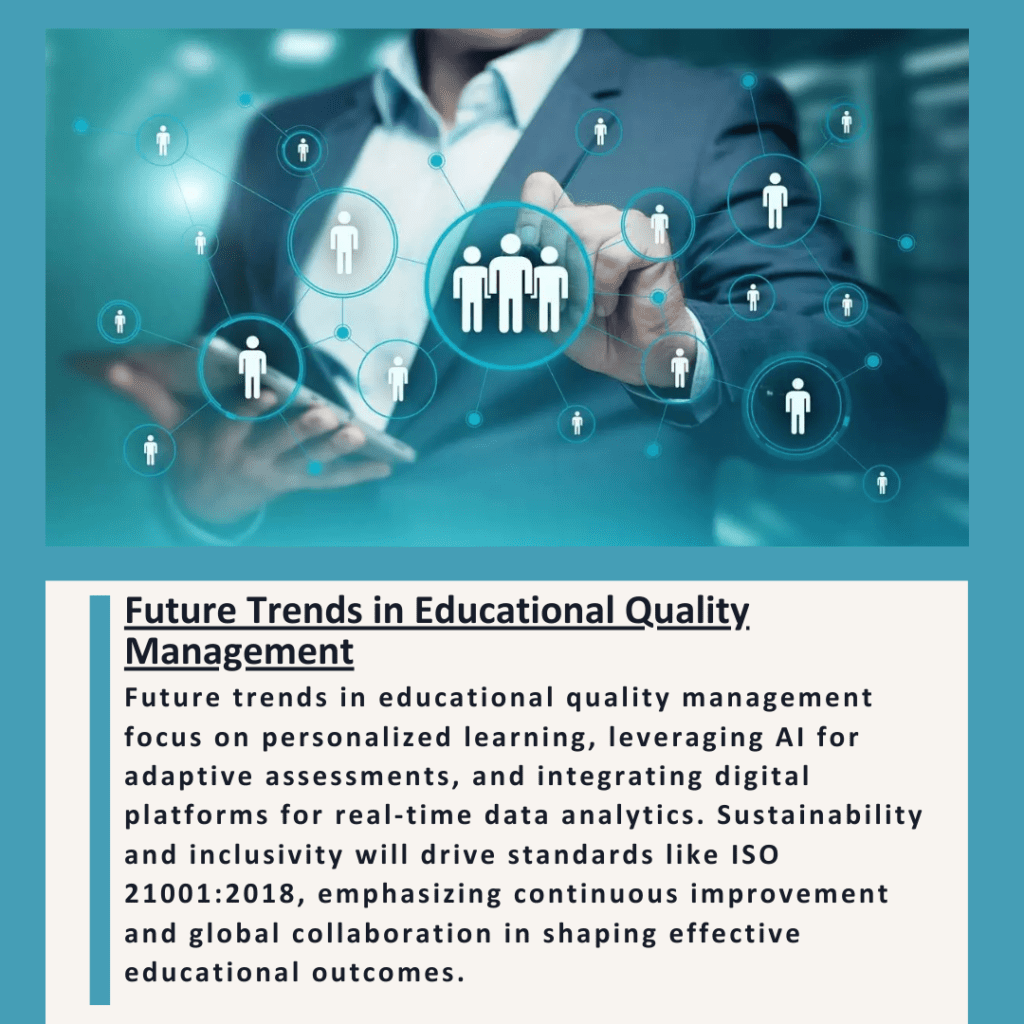Subtotal $0.00

In the realm of educational quality management, the future is poised for transformative changes driven by technological advancements, evolving educational needs, and global standards such as ISO 21001:2018. This standard, designed specifically for educational organizations, sets a framework for enhancing learning outcomes, improving operational efficiency, and ensuring continual improvement through a structured management system. As we look ahead, several key trends are likely to shape the evolution of ISO 21001:2018 and its impact on global educational standards.
Technological Integration and Digital Transformation
One of the most significant trends influencing educational quality management is the increasing integration of technology and digital tools. Educational institutions are embracing digital platforms for administrative tasks, learning management systems (LMS), and data analytics to track student performance and institutional effectiveness. ISO 21001:2018, with its emphasis on process efficiency and continuous improvement, aligns well with these technological advancements by promoting the use of data-driven decision-making and automation in educational processes.
In the future, we can expect ISO 21001:2018 to evolve to incorporate more specific guidelines on leveraging technology. This might include recommendations on cybersecurity measures, integration of AI for personalized learning experiences, and the use of blockchain for secure academic credentialing. These advancements not only streamline administrative processes but also enhance the overall educational experience by enabling personalized learning pathways and real-time feedback mechanisms.
Focus on Sustainability and Environmental Responsibility
Another emerging trend in educational quality management is the growing emphasis on sustainability and environmental responsibility. ISO 21001:2018 already encourages educational organizations to consider their environmental impact and adopt sustainable practices in their operations. Future iterations of the standard could place even greater emphasis on sustainability metrics, carbon footprint reduction strategies, and integration of environmental education into curricula.
Educational institutions that align with these trends not only fulfill their corporate social responsibility but also contribute to shaping environmentally conscious citizens. ISO 21001:2018’s potential evolution may include guidelines for measuring and reporting sustainability efforts, fostering a culture of environmental stewardship among students and staff, and integrating sustainable development goals (SDGs) into educational outcomes.
Enhanced Focus on Inclusivity and Accessibility
Inclusivity and accessibility are crucial aspects of educational quality management that are expected to gain prominence in the coming years. ISO 21001:2018 already addresses the need for educational institutions to cater to diverse learner needs and ensure equitable access to educational opportunities. Future revisions of the standard may expand on these principles by including more specific requirements for accommodating students with disabilities, promoting cultural diversity, and addressing socio-economic disparities in education.
Advancements in assistive technologies, such as text-to-speech software, adaptive learning platforms, and accessible digital content, will likely play a pivotal role in meeting these inclusivity goals. ISO 21001:2018 could evolve to provide guidance on implementing universal design principles in educational settings, creating barrier-free learning environments, and fostering a supportive learning community that celebrates diversity.
Global Collaboration and Harmonization of Standards
As educational institutions increasingly operate in a globalized world, there is a growing need for harmonization of educational quality management standards across borders. ISO 21001:2018 lays the foundation for a globally recognized framework that promotes consistency in quality management practices among educational organizations worldwide. Looking ahead, the standard could evolve to facilitate greater international collaboration, mutual recognition of certifications, and alignment with other global standards in education and quality management.
The future evolution of ISO 21001:2018 may involve closer collaboration with international bodies, educational consortia, and industry stakeholders to ensure relevance and applicability across diverse cultural and regional contexts. This could include developing guidelines for cross-border educational partnerships, promoting best practices in transnational education delivery, and fostering a global network of accredited educational institutions committed to continuous improvement and excellence.
Emphasis on Data Privacy and Ethical Considerations
In an era marked by increasing concerns over data privacy and ethical considerations in technology use, educational quality management standards like ISO 21001:2018 are likely to evolve to address these issues more comprehensively. Future revisions may include stricter guidelines on data protection, ethical use of student data for research and improvement purposes, and transparency in data management practices.
Educational institutions will need to navigate complex ethical dilemmas surrounding the use of AI in educational settings, student data privacy rights, and ensuring informed consent for data collection and analysis. ISO 21001:2018 could provide frameworks for developing robust data governance policies, conducting ethical impact assessments of technology deployments, and fostering a culture of trust and transparency among stakeholders.
Conclusion
The future trends in educational quality management are set to transform the landscape of global education, driven by technological advancements, sustainability imperatives, inclusivity goals, global collaboration, and ethical considerations. ISO 21001:2018, as a leading standard in educational quality management systems, will likely evolve to embrace these trends, providing educational institutions with a roadmap for continuous improvement, innovation, and excellence. By staying abreast of these evolving trends and incorporating them into their strategic planning, educational leaders can position their institutions as pioneers in delivering high-quality, inclusive, and sustainable education for future generations.